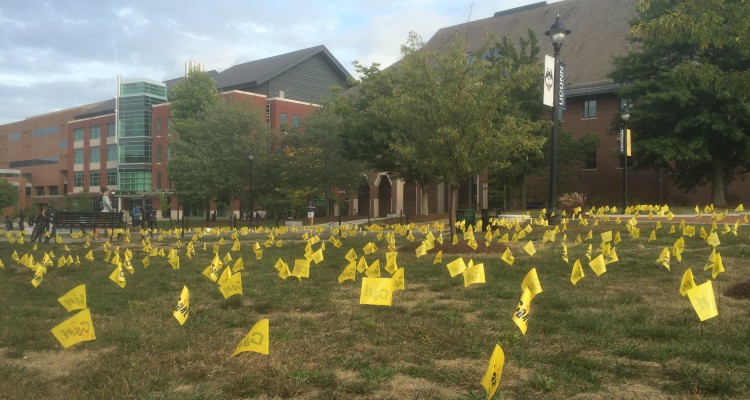Listen to the story below.
By Schae Beaudoin
The lawn in front of the student union at the University of Connecticut is covered in small yellow flags. The words “be aware, show you care” can be seen on each one, with a handwritten message on the back. Each message is different, personal to whoever wrote it.
These flags are known as the field of memories. Each year, UConn’s Active Minds organization plants the flags – 1,100 to be exact. The flags represent the 1,100 college students on average who die from suicide each year.
“Active Minds national has a campaign, they call it “send silence packing” and they do kind of the same thing that we do only with backpacks,” said Active Minds president Susan Kusmierski. “So they’ll have eleven hundred backpacks and that represents the eleven hundred college students who die annually by suicide each year. So instead of using backpacks we kind of took it and made it our own and now we use little yellow flags.”
Active Minds is an organization at UConn dedicated to mental health advocacy. They raise awareness for mental illness through campaigns like the field of memories. They also provide peer education about mental health and help set up visits by keynote speakers on topics like mental illness.
So why, at 1,100 students annually, is suicide still only something we hear about in high-profile or sensational stories?
“If eleven hundred college students were dying by Ebola or some kind of infectious disease, people would be talking about it. There’d be like a national outcry of ‘why is this happening? How can we prevent it,’” said Kusmierski, “But because it’s a mental health issue, people aren’t really talking about it.”
One of the big issues mental health groups like active minds focus on is ending the stigma surrounding mental illness.
“I would assume that for some people, they just aren’t sure why they’re feeling what they’re feeling so they might feel like their emotions are not validated, in a way,” said Kusmierski. “So they might be confused about what’s going on for them, they might not know how to put it into words. So that kind of makes it hard to open up to other people if they themselves don’t understand what’s happening.”
While suicide can be a difficult subject to talk about, Kusmierski said there are ways anybody can help. By being keenly aware and sensitive to people around you, ending the stigma surrounding suicide is achievable.
“I feel very strongly that if people were more aware of their selves and others, and that the stigma was reduced, these numbers wouldn’t be so high,” she said.
Kusmierski said having an open mind and being understanding to a friend’s situation can make a world of difference to someone who is struggling with self-harm, depression, and other factors that lead to suicide.
Students at UConn can get involved with active minds by emailing the organization at activemindsuconn@gmail.com or attending meetings in the ITE building, room 119 on Thursdays at 7 p.m.


